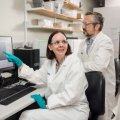A new cancer vaccine concept developed by researchers at The University of Queensland’s Diamantina Institute has been licensed to US-based developer of RNAi (ribonucleic acid interference) therapeutics, Alnylam Pharmaceuticals, Inc., through UniQuest, UQ’s main research commercialisation company.
UQ’s Diamantina Institute, specialising in cancer and immunology, is at the cutting edge of RNAi research: a natural biological process of gene ‘silencing’.
The intellectual property licensed exclusively to Alnylam relates to research from Associate Professor Nigel McMillan’s molecular virology group, which was described in a paper published in the Proceedings of the National Academy of Sciences. 1
The work investigated the use of RNAi to induce an effective immune response against tumours.
One of the most exciting aspects of this rapidly advancing frontier in biomedical research, according to Associate Professor McMillan, is the potential for treating diseases and helping patients in a fundamentally new way.
“It’s one of those holy grail areas of cancer research – finding a way for the immune system to ‘see’ cancer cells, which are very good at hiding away," Associate Professor McMillan said.
"Even current therapies such as chemotherapy and radiation treatment ultimately need the immune system to ‘clean up’ cancer cells.”
“RNA Interference is like the volume control on a radio – a way to turn down the expression (or volume) of single genes.
"Cancer is often caused by certain genes being over-expressed (or turned up far too loud) and now that the sequencing of the human genome is complete we have begun to understand which genes need turning down.
“A surprising finding from our RNAi work is that not only can we turn down genes, but we can also alert the immune system to the presence of a cancer cell.
"This means we can treat a few cancer cells and the immune system, now aware of the cancer, can attack and remove the rest of the untreated tumours.”
UQ’s Diamantina Institute put Queensland in the spotlight in 2006 when Gardasil was launched globally - the cervical cancer vaccine developed from the research of Institute Director Professor Ian Frazer and the late Dr Jian Zhou.
Associate Professor McMillan’s RNAi research has used cervical cancer as a model system to test RNAi therapy.
“In cervical cancer where genes from the human papilloma virus are driving the cancer, we have shown that turning off these genes by RNAi causes these cancer cells to stop growing and die," he said.
UniQuest also commercialised the intellectual property relating to Professor Frazer and Dr Zhou’s discovery.
The RNAi tumour-protective immune response research is a project from UniQuest’s current portfolio of technologies with life-changing potential that the company is now taking to the market on behalf of UQ and the Diamantina Institute.
“This licensing agreement opens up new opportunities for RNAi-based products to be developed into vaccines for cancers and infectious diseases,” UniQuest Managing Director, David Henderson said.
“Partnering with an international company such as Alnylam promotes collaboration and makes it possible for the Australian research community to contribute directly to global efforts in the fight against a range of terminal and chronic human illnesses,” Mr Henderson said.
Dr Stuart Pollard, Vice President, Scientific and Business Strategy at Alnylam, said the company was pleased to have secured key vaccine-related intellectual property, which describe opportunities for the advancement of novel RNAi-based vaccines in many human diseases.
“While our primary focus remains on the development of RNAi therapeutics, Alnylam’s strategy is to also explore the full breadth of RNAi applications in medicine," Dr Pollard said.
"This licence agreement with The University of Queensland will extend this strategy with emerging RNAi-based opportunities for vaccines.”
The role of RNA molecules has been under the microscope since nucleic acids were first discovered in 1868; however, RNAi and the implications gene silencing may have for drug discovery and development are widely acknowledged to represent one of the most significant biology breakthroughs already this century.
1 (PNAS) (Gu et al., Proc. Natl. Acad. Sci. USA, 106(20): 8314-8319, 2009).
Media enquiries: Leanne Wyvill +61 7 3365 4037, 0409 767 199 or l.wyvill@uniquest.com.au
About UniQuest
Established by The University of Queensland in 1984, UniQuest is widely recognised as one of Australia’s largest and most successful university commercialisation groups, benchmarking in the top tier of technology transfer worldwide. It has created more than 60 companies, and since 2000 UniQuest and its start-ups have raised more than $340 million to take UQ technologies to market. Sales of products using UQ technology and licensed by UniQuest have exceeded $5 billion per year. UniQuest also commercialises innovations developed at the University of Wollongong, University of Technology Sydney, James Cook University, University of Tasmania, the Mater Medical Research Institute and two ARC Centres of Excellence. As well, UniQuest can access thousands of researchers and experts and tailor a consulting or project R&D solution to meet the needs of industry and government. UniQuest is also a leading Australasian provider of international development assistance projects. Working with agencies such as AusAID, NZAID, the Asian Development Bank, and the World Bank, UniQuest has developed and implemented more than 400 projects in 46 countries throughout the Pacific, South-East Asia, the Indian sub-continent and Africa. For more information about UniQuest, please visit www.uniquest.com.au.
About the UQ Diamantina Institute
The University of Queensland Diamantina Institute is a modern research facility where clinical and basic science converge in the translational research of cancer and disorders of immune regulation. Headed by 2006 Australian of the Year, Professor Ian Frazer, the Institute is host to over 200 researchers, students and support staff.
Based at Brisbane’s leading teaching hospital, the Princess Alexandra Hospital, The University of Queensland Diamantina Institute has strong clinical interactions and world-class facilities that enable researchers to be at the forefront of their fields. Our researchers focus their efforts at turning their scientific discoveries into better treatments for diseases like cancer, osteoporosis, arthritis and other autoimmune diseases.
.jpg)



